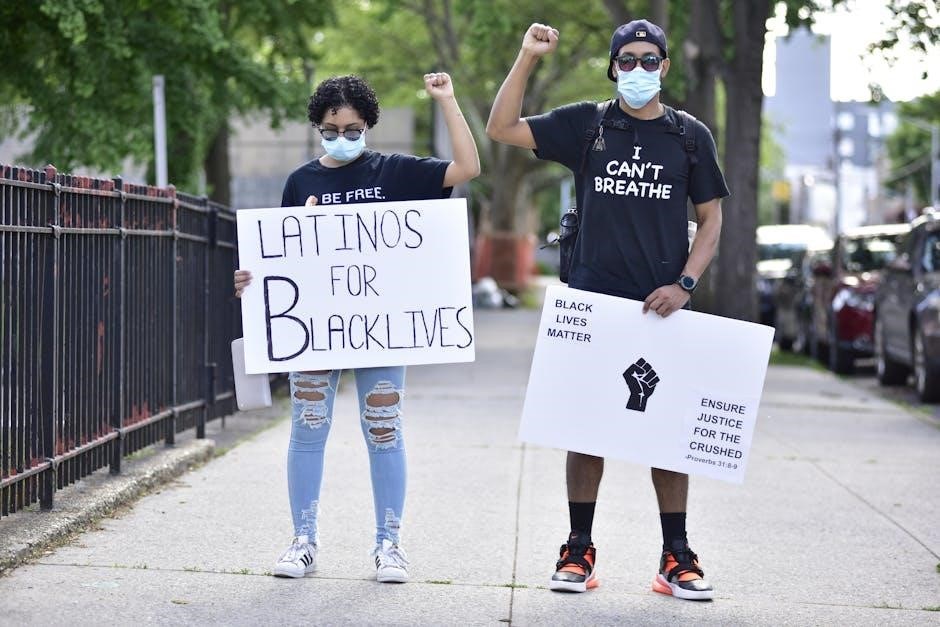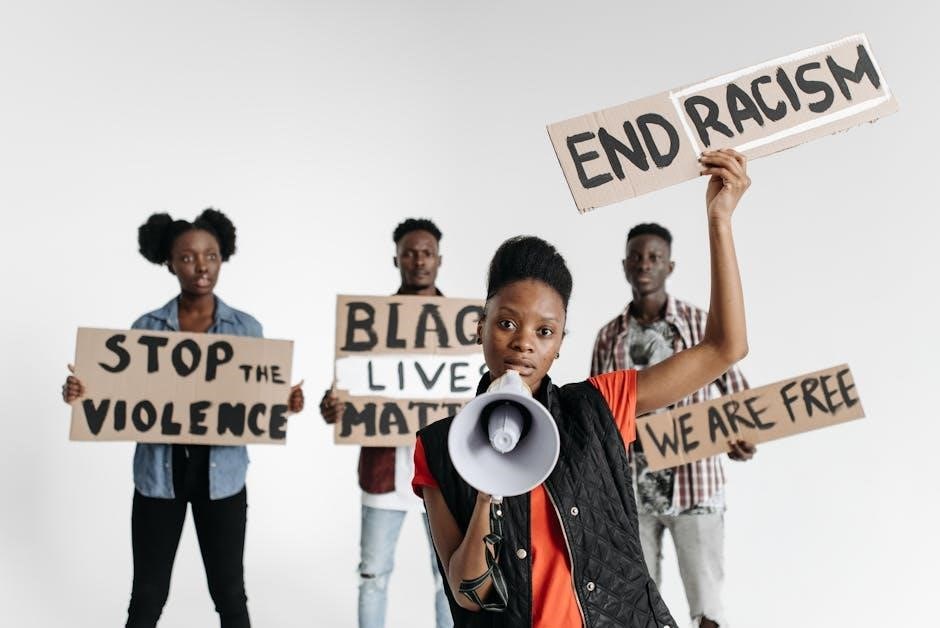This section explores foundational concepts of diversity and social justice, introducing key terms and frameworks․ It emphasizes the importance of education in promoting equity and inclusion․

Diversity refers to the presence of differences within a setting, while social justice advocates for fair treatment and equal opportunities for all individuals․
Understanding these concepts is essential for addressing systemic oppressions and fostering inclusive environments in education and society․
Foundational Understanding of Social Justice
Social justice is rooted in the principles of equity, inclusion, and human rights, aiming to address systemic inequalities and promote fair opportunities for all individuals․ It involves recognizing and challenging oppressive structures that marginalize certain groups based on race, gender, class, ability, religion, or other identities․ A foundational understanding of social justice requires acknowledging the historical and ongoing impacts of discrimination and privilege․ This framework emphasizes the importance of collective action and advocacy to create societies where everyone can thrive․ By fostering empathy, critical thinking, and awareness, social justice education empowers individuals to contribute to meaningful change․ The anthology Readings for Diversity and Social Justice serves as a vital resource for exploring these concepts in depth․

Key Terms and Frameworks for Diversity
Key terms in diversity include diversity, equity, and inclusion, which form the cornerstone of social justice efforts․ Diversity refers to the presence of differences among individuals, while equity ensures fair access to resources and opportunities․ Inclusion involves creating environments where all individuals feel valued and respected․ Frameworks like intersectionality, coined by Kimberlé Crenshaw, highlight how multiple identities (e․g․, race, gender, class) intersect to shape experiences of oppression․ Understanding privilege and oppression is also critical, as these concepts explain systemic inequalities․ These terms and frameworks provide a lens for analyzing and addressing social injustices, fostering a more equitable society․ Resources like Readings for Diversity and Social Justice offer in-depth explorations of these concepts, aiding educators and learners alike․

Overview of “Readings for Diversity and Social Justice” by Maurianne Adams
Readings for Diversity and Social Justice is a comprehensive anthology addressing social justice issues like racism, classism, and ableism․ It features contributions from activists and scholars, providing a wide range of perspectives to educate on systemic oppressions and promote inclusivity․ The book is widely used in educational settings to foster critical thinking and dialogue on diversity and equity․ Its structured approach makes it a valuable resource for understanding and addressing social justice challenges․ The anthology has been updated to include contemporary movements like Black Lives Matter, ensuring relevance in current discussions․ It remains a trusted tool for educators and learners committed to social justice․
Structure and Content of the Book
Readings for Diversity and Social Justice is organized into sections addressing specific forms of oppression, including racism, classism, ableism, and religious oppression․ Each section provides a mix of theoretical frameworks and personal narratives to deepen understanding․ The book also includes an integrative section on sexism, heterosexism, and transgender oppression, emphasizing intersectionality․ The latest edition incorporates over 40 new readings, focusing on contemporary issues like the Black Lives Matter movement․ The anthology is designed to educate readers on systemic inequalities and promote dialogue․ Its structure allows for a comprehensive exploration of social justice topics, making it a valuable resource for educators and students seeking to understand and address diverse social justice challenges․ The book’s content is both academic and accessible, ensuring broad applicability in educational settings․
Significance of the Anthology in Social Justice Education
Readings for Diversity and Social Justice holds a pivotal role in education by providing a comprehensive exploration of social justice issues․ Its wide range of perspectives and voices fosters critical thinking and empathy, essential for understanding systemic inequalities․ The anthology’s structure, which covers various oppressions and their intersections, equips educators and students with the tools to address these issues effectively․ By incorporating both foundational theories and contemporary case studies, the book bridges academic and practical knowledge․ Its accessibility and depth make it a vital resource for promoting inclusive education and encouraging activism․ The anthology’s impact lies in its ability to inspire meaningful dialogue and empower individuals to advocate for social change, aligning with the goals of social justice education․

Exploring Social Oppressions

This section examines systemic inequalities, focusing on racism, classism, and ableism․ It highlights their impact on marginalized communities, emphasizing the need for awareness and collective action․
Racism, Classism, and Ableism
Racism, classism, and ableism are systemic forms of oppression that perpetuate inequality and marginalization․ Racism involves discrimination based on race, while classism highlights economic disparities and access to resources․ Ableism targets individuals with disabilities, often excluding them from full participation in society․ These oppressions intersect, creating compounded experiences of discrimination for many individuals․ Understanding these concepts is crucial for promoting social justice and equity․ The book Readings for Diversity and Social Justice provides comprehensive analyses of these issues, offering frameworks for addressing and dismantling systemic inequalities․ By exploring these topics, readers gain insights into the historical and contemporary impacts of such oppressions on marginalized communities․ This knowledge is essential for fostering inclusive environments and advocating for change․
Religious Oppression and Intersectionality
Religious oppression involves discrimination based on one’s faith or belief system, often manifesting in exclusion or marginalization․ Intersectionality, a concept introduced by Kimberlé Crenshaw, examines how overlapping identities such as race, gender, and religion create unique experiences of oppression․ The anthology Readings for Diversity and Social Justice explores these themes, highlighting how religious oppression intersects with other forms of systemic discrimination․ By addressing these issues, the text provides a comprehensive understanding of how individuals experience multiple layers of marginalization․ This framework is vital for developing inclusive strategies to combat oppression and promote social justice․ The discussion emphasizes the importance of recognizing and addressing these intersections to create equitable societies․

The Role of Education in Promoting Diversity and Social Justice
Education fosters diversity and social justice by creating inclusive environments and encouraging critical thinking․ Educators use resources like the anthology to cultivate empathy, preparing students to advocate for equity and challenge inequalities, empowering them to contribute to a just society․
Teaching Strategies for Social Justice
Effective teaching strategies for social justice involve fostering inclusive classrooms, promoting dialogue, and integrating diverse perspectives․ Educators use anthologies like Readings for Diversity and Social Justice to provide students with diverse voices and experiences, encouraging empathy and critical thinking․ Interactive methods, such as group discussions and reflections, help students connect personal experiences to broader social justice issues․ These strategies empower learners to recognize and challenge systemic inequalities․ By incorporating real-world examples and case studies, educators create spaces for meaningful engagement․ Such approaches not only enhance understanding but also inspire action, preparing students to advocate for equity and justice in their communities․ These methods are essential for cultivating socially conscious and active learners․
Impact of Diversity on Student Experiences
Diversity significantly enhances students’ intellectual and social experiences, fostering empathy, collaboration, and cultural awareness․ Exposure to diverse perspectives broadens understanding, reducing stereotypes and biases․ Inclusive environments encourage students to engage with differing viewpoints, promoting critical thinking and problem-solving skills․ This exposure prepares students for a global society, where adaptability and openness to diverse cultures are crucial․ Additionally, diversity in education helps students develop a sense of belonging and identity, fostering resilience and confidence․ By experiencing diverse interactions, students gain a deeper understanding of social justice issues, equipping them to advocate for equity and inclusivity in their communities․ These experiences create well-rounded individuals capable of navigating and contributing to a multifaceted world․

Resources for Free Access to Social Justice Materials
Free PDFs of Readings for Diversity and Social Justice and similar texts are available on platforms like b-ok․cc, supporting equitable access to social justice education․
Open Textbooks and Free PDF Resources
Open textbooks and free PDF resources are invaluable for accessing social justice materials without cost barriers․ Platforms like b-ok․cc offer free downloads of texts such as Readings for Diversity and Social Justice by Maurianne Adams․ These resources enable educators and learners to engage with critical content on diversity, equity, and inclusion․ Open textbooks are often licensed under Creative Commons, allowing users to download, share, and adapt materials freely․ This accessibility is particularly beneficial for students and educators seeking affordable ways to explore social justice topics․ By providing free access to these materials, open resources help democratize education and promote widespread understanding of social justice issues․ They are essential tools for fostering inclusive learning environments and supporting diverse student needs․
Online Platforms for Accessing Educational Materials
Online platforms play a crucial role in providing free access to educational materials on social justice․ Websites like b-ok․cc and open textbook repositories offer free PDFs of essential texts, including Readings for Diversity and Social Justice․ These platforms enable users to download, share, and adapt materials without financial barriers․ They are particularly valuable for educators and students seeking affordable resources to explore topics like systemic oppression and diversity․ By offering a wide range of educational content, these platforms promote equitable access to knowledge and support the integration of social justice education into various curricula․ This accessibility ensures that diverse perspectives and critical issues are widely available, fostering inclusive learning environments globally․ Such platforms are indispensable for modern education, making social justice materials accessible to all․

Current Topics and Movements in Social Justice
The Black Lives Matter movement highlights systemic racism and police reform․ Current social justice efforts focus on education, advocacy, and community engagement, driving societal change and equity․
Black Lives Matter and Contemporary Issues
The Black Lives Matter movement has become a pivotal force in addressing systemic racism and police violence against Black individuals․ It has sparked global conversations about racial justice, equity, and the need for systemic change․ The movement emphasizes the importance of amplifying Black voices and challenging institutional racism․ In the context of social justice education, resources like Readings for Diversity and Social Justice provide critical frameworks for understanding these issues․ The anthology includes essays that address contemporary topics such as racial oppression, intersectionality, and the impact of social movements on creating a more just society․ By engaging with these materials, educators and learners can deepen their understanding of the historical and current struggles faced by marginalized communities, fostering empathy and activism․
Emerging Trends in Social Justice Education
Social justice education is evolving, with emerging trends focusing on intersectionality, critical race theory, and inclusive pedagogies․ There is a growing emphasis on integrating diverse perspectives into curricula to reflect the complexities of identity and oppression․ Digital resources, such as free PDFs of Readings for Diversity and Social Justice, are becoming essential tools for educators․ These materials provide accessible frameworks for discussing contemporary issues like systemic racism, gender equity, and disability rights․ Additionally, the rise of online platforms and open-access textbooks is democratizing education, allowing broader audiences to engage with social justice topics․ These trends highlight the importance of continuous learning and adaptability in addressing ever-changing social justice challenges․




About the author